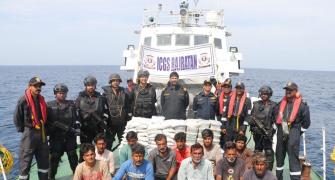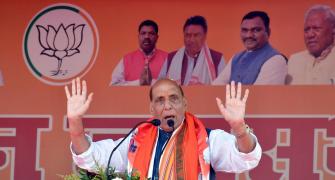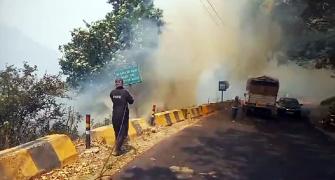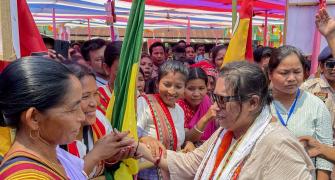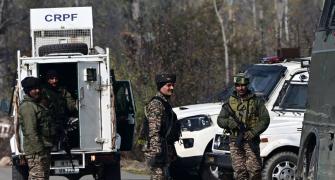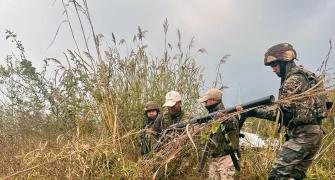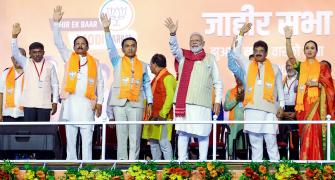The picturesque Mansehra valley, whose historical significance dates back to Emperor Ashoka and Alexander, has been relegated by a single stroke of nature's fury to the list of perished heritage sites.
Balakot, where Emperor Ashoka is believed to have interned as Governor way back in 270 BC, was the crown of Pakistan's Mansehra valley with its green terraced fields and scenic beauty, but is now reduced to a death bed with bodies lying buried under tombs of twisted steel and concrete.
- Complete Coverage: Terror from the earth
Pakistan historians say that Alexander provided Balakot with a Kashmir link by handing it over to Abisaras, the Raja of Poonch, after conquering it.
Now, a pall of gloom hangs over the town, whose famed green terraced mountains have been turned into swathes of white devoid of grass by the October 8 quake. The quake shook the mountains so loose that the white sand and its broken rocks kept on sliding, perhaps due to relentless powerful aftershocks even ten days after the quake.
"For this town and for us, the clock stopped after the quake. The last I remember... we felt the earth shaking, the building caved in and the part of my hotel slid into the river," said Arif Ahmad Khan, an employee of a hotel that was built on the edge of Kanhar river.
Khan was lucky to be pulled out alive of the debris with a few injuries, with no idea as to how many people still lay buried under the rubble of his building.
Before the quake struck, Balakot, located on the way to beautiful Kegan valley provided stable employment to thousands with its large number of restaurants and hotels.
Even as quake survivors narrated their tales of horror to the media, the Pakistani army tried to pull out a crumbled lorry out of the rubble assisted by heavy machinery.
"We are struggling to clear a lorry stuck in rubble of one building. Here hundreds of buildings and shops collapsed. Where will we move these mounds of concrete. It is perhaps the end of this place," says a police constable.
Though it survived with little damage, an equally major tragedy awaited the Mansehra town located about 25 km from Balakot where about 10,000 injured were being treated in the local Post Graduate Hospital.
"We are perhaps sitting on yet another tragedy as number of patients are getting infected with gangrene," said Dr Pervez Shah, one of the many Pakistan doctors who rushed to the quake-affected place to help the people. He said gangrene had become a massive problem as lot of injured persons were pulled out of their crumbled homes late.
Even those who underwent surgery face grim survival chances as there are no trained paramedical staff available.
"We need post operative care without which the patients are not going to survive," Shah said.
Beneath Balakot, Hassah village, where a degree college partially collapsed, has become a hub of activity as the army with assistance of non governmental organisations geared up to build a tent city in the play ground.
They managed to set up about 150 tents mainly to accommodate large number of displaced people from small villages located in the hills.
"We must have done something terrible for suffering this punishment. Almost all the villages in the hills have been destroyed and hundreds killed," 75-year-old Khurshid Khan bemoaned.
Munir Khan, an activist of Jahandad society helping the army to set up the tent city said a team of professional porters from Skardu in the northern areas have been hired to trek to the villages on the hills to distribute supplies.
"The quake is perhaps the bigger natural disaster than tsunami. This is three times worse that the quake that hit Quetta in 1935. The army has thrown all its manpower and assets to help people," Maj Gen Shakeel Hussain, who opened a brigade headquarters in Mansehra to coordinate the operations in the region, said, adding that 20,000 people had been killed as per official estimates.
Complete Coverage: Terror from the earth

